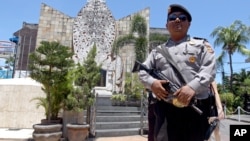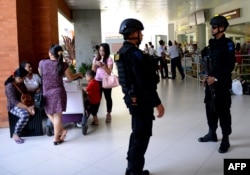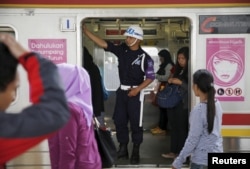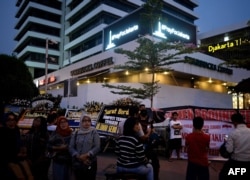In Indonesia there are growing concerns that more deadly attacks could follow last week’ bombings in Jakarta by Islamist militants.
Bali police Tuesday say they received an anonymous letter warning that the resort Island will be the next target for a terrorist assault.
"The letter was sent by an anonymous individual to Buleleng district, and the police are still conducting an investigation, and trying to find out who sent the letter. But again, I urge people in Bali not to be afraid, but they should stay alert," said Bali Police Chief Sugeng Priyanto.
Authorities say they've increased security at shopping malls and other locations that draw crowds in Bali.
In 2002, the popular resort island was targeted by Jemaah Islamiyah (JI), an Indonesia-based terrorist group with links to al-Qaida. The bombing of a club in Bali killed 202 people, mostly foreigners.
The Bali bombing severely hurt Indonesia’s tourism industry, and began a decade of deadly plots in Indonesia carried out by Southeast Asian militants affiliated with al-Qaida.
Indonesia successfully combated the JI related terrorist threat through police action, intelligence operations and high profile criminal prosecutions.
However, after last week's attack in the center of Jakarta that killed eight people, including four militants, Indonesian security forces are raising concerns that more and deadlier attacks could follow, carried out by groups inspired by Islamic State.
The Jakarta attack was the first of its kind in Southeast Asia to be attributed to Syria-based militant Islamists.
Authorities say about 500 Indonesians have travelled to the Middle East to join the extremist group. About 100 are believed to have returned, although experts say only about 15 have combat experience.
Jakarta back to normal
So far the renewed threat of terrorism has not instilled any widespread sense of panic or fear amongst Indonesians.
Life in Jakarta has quickly returned to normal, less than a week after the deadly attacks.
On Tuesday the Starbucks coffee shop that was bombed remained closed and boarded up for repairs, but the memorial of flowers had been removed. Other shops have reopened and traffic at the busy intersection was congested as usual.
'Ojek' hero
The “ojek” motorcycle taxi drivers were again gathered at the intersection where the attack took place, waiting for their next fares.
One of the “ojek” drivers back at work is Muhamad Yunus, who has received widespread praise for the selfless courage he exhibited during the attack.
The militant attackers last Thursday (January 14) set off two bombs, the first at the Starbucks and the second at a police traffic station in the middle of the intersection, near Jakarta's oldest department store, Sarinah.
After the second explosion Yunus rushed to the police station to help the wounded even though the assailants were shooting at anyone in the area. He said he found a woman whose legs were severely injured and brought her to safety, away from the firefight.
“I got that woman and I told her, don’t cry. Please be strong. Be strong. Please don’t be sad,” Yunus said.
Yunus said he found out later that the woman and her nephew were stopped by the police for a traffic violation at the time of the blast. Her nephew died in the explosion.
Kami tidak takut
After the Jakarta attack there have been demonstrations by Indonesian Muslims to denounce terrorism and call for the government to eradicate radical militants and supporters of Islamic State in the country.
Indonesians also have started to use hashtags like "PrayforJakarta" and "Kamitidaktakut" or "Wearenotafraid" in English, on social media.
Yunus’s act of heroism has been held up as an example of Indonesia’s resolve to stand up against terrorism.
“I am not afraid. We won’t be scared any more,” he said.
Dismantling terror networks
Meanwhile Indonesian authorities have promised to intensify their efforts to monitor radical networks in the country.
Police believe the alleged mastermind of the Jakarta attack, an Indonesian fighting with Islamic State in Syria called Bahrun Naim, used social media to communicate his radical ideas to followers in Indonesia.
In December police say they successfully disrupted plans by militants to launch a string of deadly attacks on Christmas and New Year celebrations, as well as against the country's Shia Muslim minority.
Prior to last week, the last major attack in the world's most populous Muslim nation was the twin bombing of luxury hotels in Jakarta in 2009.
Ade Irma in Jakarta contributed to this report.















